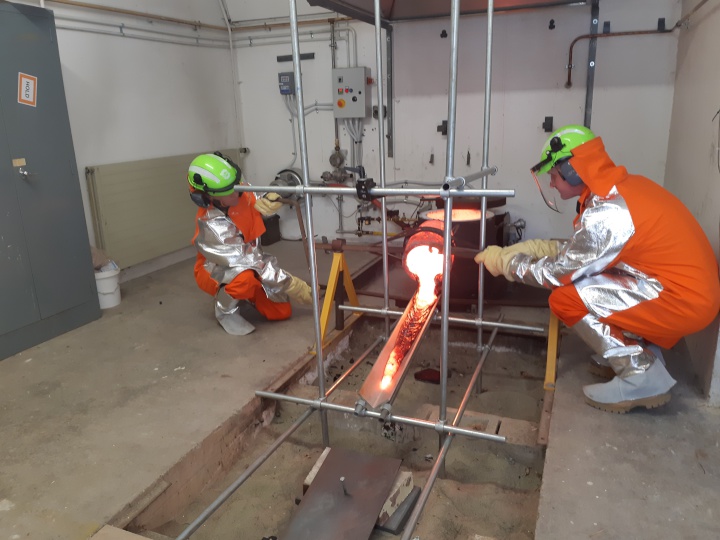University creates first lava flow in Christchurch
University creates first lava flow in Christchurch in 6 million years
While Christchurch has had its share of natural disaster hazards it has been relatively lava free, until now. At the University of Canterbury’s School of Fine Arts, real lava has been pouring out of a new research facility – the Lava Laboratory – which may help researchers monitor lava flows in Hawaii and the rest of the world.
A STEAM-y team of Canterbury and Hawaii volcanologists, engineers, mathematicians and artists has been working together to supersize a bronze casting furnace so it can melt rock to make lava.

Photo caption
photo credit: University of Canterbury
Canterbury scientists wearing Kevlar protective gear create
lava at 1300degC in the new Lava Laboratory at the
University of Canterbury.
According to the UC researchers, the controlled experimental lava flows will be used to develop new ways to monitor and model lava flows. It will be extremely useful for volcanologists to be able to monitor lava flows from above, and then mathematicians and fluid dynamics modellers will be able to calculate what the lava properties are.
USGS scientists helping to monitor eruptions in Hawaii are part of the lava laboratory team and very interested in the results.
“One of the primary missions of the USGS is to protect life and property from natural disasters,” USGS Research Geologist Elise Rumpf says. “This project will help us better understand how lava flows behave, which will improve our ability to predict how they will affect communities all over the world.
“This kind of work could be extremely useful for monitoring lava flows in Hawaii and the rest of the world, and maybe even on other planets. For New Zealand it will help us prepare for future lava flow events that will one day affect Auckland,” she says.
The Head of UC’s School of Fine Arts Aaron Kreisler says he’s pleased to see Arts combine with STEM in this multi-disciplinary collaboration.
“This represents a significant opportunity for our team to learn from colleagues in other disciplines in meaningful, engaging and really disruptive ways,” he says. “We know that it will lead to amazing collaborative projects and new research from these practitioners in the coming years and we’re excited about this initial step.”
Until now lava research at UC has been limited to using analogue (equivalent) fluids like syrup. Geology Master of Science student Dale Cusack has been pioneering this work, successfully demonstrating you can calculate the syrup properties from above.
“Working with lava analogues introduces its own set of unique challenges,” Mr Cusack says. “However, I am keen to leave behind the golden syrup that is insanely sticky and I’m sure the Geology building caretakers hate me for tramping it all through the building.”
Moving from modelling a cool sticky fluid that behaves in ways Isaac Newton could predict to less predictable hot lava will be challenging but rewarding, according to the researchers.
UC Mechanical Engineering Associate Professor Mathieu Sellier recently won a $917,000 Marsden grant to study the fluid dynamics of lava using the lava laboratory.
“The development of predictive mathematical models and numerical algorithms to solve them will better inform volcanic hazard management strategies,” Dr Sellier says. “The lava lab will be a fantastic opportunity to put the mathematical models to the test and improve their predictive capability.”
UC Volcanologist Associate Professor Ben Kennedy is collaborating with Dr Selliers on his project: Indirect measurement of lava rheology.
“If we can learn about the lava properties from above in the lab, this means a video from a helicopter or a drone made during an actual eruption could be used to predict paths of an ongoing eruption,” Dr Kennedy says.
ENDS


 Office of the Privacy Commissioner: New Research Shows Business Leaders Fear Being On The Hook For Others’ Privacy Breaches
Office of the Privacy Commissioner: New Research Shows Business Leaders Fear Being On The Hook For Others’ Privacy Breaches E Tū: E Tū Members Send Open Letter To James Grenon And NZME Board
E Tū: E Tū Members Send Open Letter To James Grenon And NZME Board Commerce Commission: Commission Calls For Comments On Copper Access Deregulation
Commerce Commission: Commission Calls For Comments On Copper Access Deregulation New Zealand Association of Scientists: NZAS Supports Saving Biotechnology Capacity In Callaghan; Asks What Now For Applied Technology Group
New Zealand Association of Scientists: NZAS Supports Saving Biotechnology Capacity In Callaghan; Asks What Now For Applied Technology Group Stats NZ: Business Employment Data - December 2024 Quarter
Stats NZ: Business Employment Data - December 2024 Quarter Transpower: System Operator Launches Review Of Electricity Risk Forecasting Framework
Transpower: System Operator Launches Review Of Electricity Risk Forecasting Framework 



